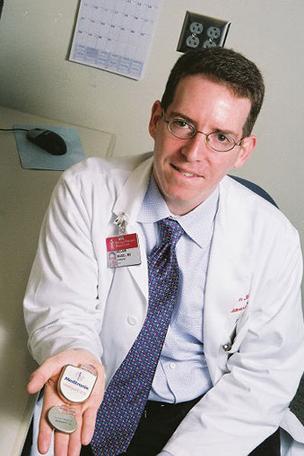Posted in Regulatory and Compliance by Kristopher Sturgis on December 12, 2014 Bill Maisel, director of science at the FDA’s Center for Devices and Radiological Health, holds CRM devices.

Earlier this week the science chief of the U.S. Food and Drug Administration spoke about the agency’s efforts to improve the process it uses to clear and approve medical devices. Bill Maisel, deputy director of science at the FDA’s Center for Devices and Radiological Health, said in Cambridge, MA that the agency had made progress in the area.
Maisel spoke on the topic to members of MassMEDIC. His speech was one of several events put on by the FDA intended to provide an overview on topics in regulatory approval for the coming year. The agency’s priorities entering the new year include strengthening the clinical trial process for devices, according to a news release from the Boston Business Journal.
“We want patients in the U.S. to have access first in the world to the technology,” Maisel said. “That means timely approval trials.”
To illustrate the agency’s commitment, Maisel noted that the agency has cut down the average length of time from the submission of an application to run a trial, to a decision on the application by 75% in the past three years. In 2011, it took an average of more than 400 days for such an application to be processed. This year, Maisel reports that the average application is now processed in 101 days.
The FDA has also taken strides to sort through the categories of medical devices in an effort to identify devices considered high-risk, for which the most data is required for approval. The agency has already reviewed half of the high-risk devices as they look for any that can be downgraded in order to speed up the approval process.
Maisel also says that the agency is working to improve its level of customer service by collecting feedback, with the goal of reaching a 70% satisfaction rate among industry representatives and other government agencies that work alongside the FDA. Maisel noted that the Center for Devices and Radiological Health received an 84% approval rating, surpassing its goals.
In related news, the FDA has been criticized for not disclosing the extent of its financial ties to industry. The Wall Street Journal recently explained that a number of doctors sitting on FDA review panels also have links to device makers—connections that the agency doesn’t disclose publicly.
In panels evaluating devices involved in cardiology, orthopedics, and gynecology from 2012 through 2014, a third of 122 members had received compensation (in the form of money, research grants, or food and travel) from medical device companies, according to The Wall Street Journal. Nearly 10% of the FDA advisors received something of value from the specific company whose product they were evaluating, but the FDA only disclosed roughly 1% of these corporate connections.
The FDA maintains that broader disclosure of corporate connections could discourage people from sitting on advisory panels, something the agency already struggles with. Many doctors have a strong financial disincentive to serve on advisory boards because they can take a significant amount of time away from their practices.
For now, the FDA appears to be working tirelessly to address many of these concerns, in an effort to make the process of medical trial and device approval as timely and efficient as possible. Whether or not these concerns are truly being addressed in a discernable fashion, remains to be seen.





